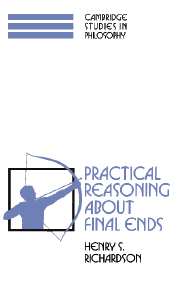II - Practical reasoning
Published online by Cambridge University Press: 05 June 2012
Summary
Setting out to show that we can deliberate rationally about ends, it behooves me to articulate what I take to be the marks of whether a given course of deliberation is rational or not, and more generally what I have in mind by “practical reasoning.” The terrain of rationality being what is contested, there is no noncontroversial way to lay out these marks. There is no core concept of rationality shared between me and my opponents, such that simply setting out a counterexample to their limited view would force them to recognize that we can deliberate rationally about ends. Yet I shall not simply concede them the word “rational,” and accept some other term – perhaps “reasonable” – to cover well carried out deliberation of ends. This fact provides one of my main motivations for taking the more indirect route of first clearing away the three philosophical obstacles to allowing for this possibility. Although the marks of rationality that I develop here may accordingly be expected to beg some questions, they do not provide the first premises of my argument. I set them out nonetheless in order that the reader may better understand the goal towards which this book is directed. For similar reasons, I want to situate (practical) reasoning as I understand it in relation to issues of objectivity and truth (§4) and to explain that although it cannot usefully be captured by a “logic of practical inference” (§5), the general practical “ought” does give it some logical structure (§6).
- Type
- Chapter
- Information
- Practical Reasoning about Final Ends , pp. 22 - 46Publisher: Cambridge University PressPrint publication year: 1994
Accessibility information
- 1
- Cited by

